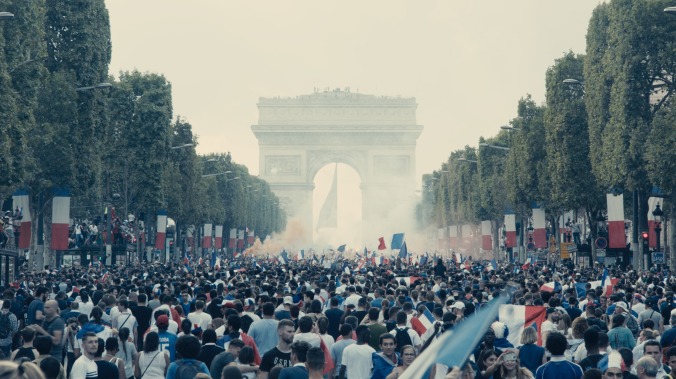Parisian cop drama Les Misérables speaks the same righteous language as Victor Hugo

No one mounts a barricade in this Les Misérables, the debut feature from French documentarian Ladj Ly. Nor does anyone steal a loaf of bread or break a windowpane. Yet Ly’s immersive film, a crime drama that evokes both the unrelenting energy of Training Day and the empathetic investigative spirit of David Simon’s The Wire, shares more than a location and a revolutionary spirit with Victor Hugo’s novel. Like Hugo, Ly—who also shares a screenwriting credit on the film—picks up his tools and uses them to chip away not at the moral failings of his characters, but at the world that made them who they are. Jean Valjean broke the law to feed a child, and that act defined the rest of his life; centuries later, the people of the Parisian suburb Montfermeil find themselves, like Hugo’s famous protagonist, left only with bad options. And like Valjean, they too discover that it’s all made worse by cops.
Set in the Paris-adjacent neighborhood that several of Hugo’s characters (and Ly himself) call home and inspired by the 2005 riots in Paris, Les Misérables follows Stéphane Ruiz (Damien Bonnard of Staying Vertical), a policeman newly arrived in the city from a much sleepier area. He’s thrown in with two longtime partners working turf they know intimately: Chris (Alexis Manenti), openly racist and prone to violence, and Gwada (Djebril Zonga), quiet but keyed up. There are shady deals and uneasy truces, back-scratching and macho posturing. As they chat up and stare down the residents of a community they also call home, it becomes ever more apparent—to Ruiz and the audience alike—that they are in no way in charge. When an altercation with a group of kids suspected of stealing a lion cub from a nearby circus goes horribly wrong—a situation far more fraught and nightmarish than it sounds—the lie of the cops’ authority finally fully dissipates, and many boiling pots begin to bubble over at once.
It’s a chaotic moment that begets further chaos, shifting the power dynamics in a way that can be difficult to track—sometimes effectively, sometimes less so. But the potency of the film’s back half is undeniable. The last act is among the most anxiety-inducing sequences in film in the last year, no small feat for a time period that includes both Her Smell and Uncut Gems. Ly, cinematographer Julien Poupard, and editor Flora Volpelière are merciless, allowing the camera to move with a fluidity its subjects are never granted, save one (Issa Perica, a real find, as the Gavroche figure of the film). Both Perica and the film move with a kind of skulking grace, which somehow makes the chaos all the more overwhelming.
Ly’s understanding of his home turf proves an invaluable asset, allowing him to imbue the film with a potent sense of place. There’s tension in the early going, but it’s one of inevitability. We know bad things are coming, because watching the tension slowly rise both within the community and in the individuals we encounter makes it clear that no other end is possible. These encounters are rich in detail: In one scene, the cops meet Owl, an ex-con now out hustling for work in a button-down shirt and sport coat. As Owl turns to walk away, we see sweat stains have spread across his back like a second pair of lungs. A screwdriver opens a gate; kids sit and discuss inevitable injuries and burning bodies; a drone hovers, a sound that becomes increasingly familiar and significant. The film meanders, then leaps and snarls like a dog in a thunderstorm.
Like Simon, Ly and his fellow screenwriters condemn bad actors, but come down hardest on the broken systems and corrupt institutions that created them. Glimpses of the quiet home lives of all three officers don’t serve so much to humanize them as to point out that decent people can become monsters when given power and little oversight. The film balances its final moments on a blade made sharp by injustice and corruption, before returning at last to a quote from Victor Hugo that brings the point home. It’s not subtle, and it’s not pleasant. It’s angry, and it’s honest. Hugo would approve.